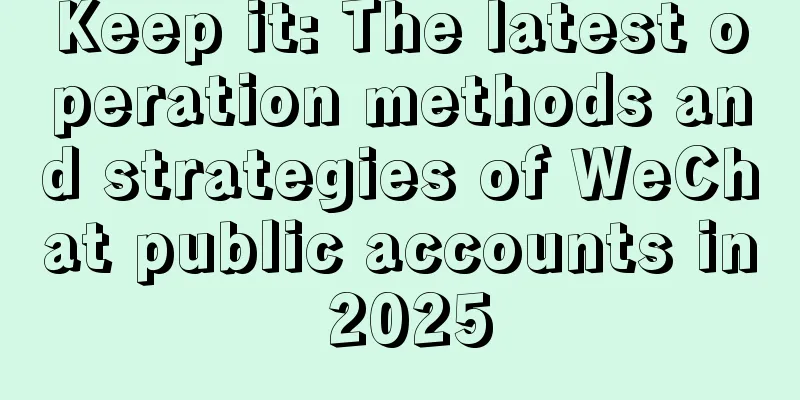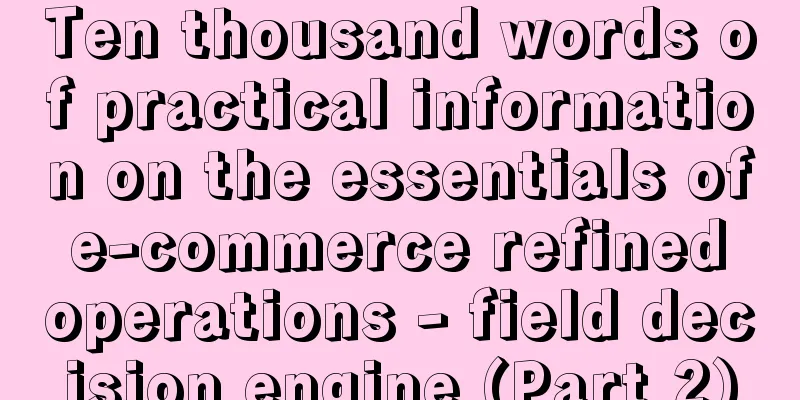Very professional! Found a way to [data-guided operations]
![Very professional! Found a way to [data-guided operations]](/upload/images/67e6e1480f49c.webp)
"Data analysis should guide operational decisions and provide feasible suggestions" is the requirement of many companies for data analysts. However, when it comes to doing it, many students complain: the operations department doesn't listen to my suggestions! They don't follow my advice! How can I implement it... In fact, this kind of pain is caused by a misunderstanding of the meaning of "guidance". People think that "guidance" means: I say whatever, and the operations department does it! This is no longer guidance, but making decisions for others and being their boss. They have directors, VPs, and CEOs above them in operations, so it is not the data analyst's turn to make decisions. This kind of meddling will definitely not work. So what should we do? 01 A common example to understand the guidance methodLet's look at how the military advisors in "Romance of the Three Kingdoms" guide the lord's decision-making. All the military advisors who shouted, "If the lord doesn't listen to me, he will suffer a great defeat" were dragged out and killed by the lord. At this time, the lord's inner monologue is: "Am I the lord or are you the lord!" The military advisors who are truly trusted by the lord speak in these 4 ways. Method 1: Q&AThe lord asked: What formation is the enemy in? Military Advisor: The enemy has deployed the Eight-Gate Golden Lock Formation, which is divided into... At this time, the lord did not understand the situation, and the military advisor gave him general knowledge, and explaining things clearly was "supporting" the decision. Method 2: SuggestionThe lord asked: What good strategy does the military advisor have to repel the enemy? The military advisor replied: The best strategy is to take advantage of the fact that the enemy has come from a long distance, is exhausted and has little food and grass, and then fortify the city and clear the fields. The middle strategy is... The worst strategy is... There are lots of details here:
Interestingly, we found that the lord rarely chooses the best strategy, and often chooses the worst or even the worst strategy. At this time, there is the opening scene, and those military advisors who stubbornly insist that "the lord will be defeated if he doesn't listen to me" are all snapped, while the smart military advisors keep silent, and the smarter ones have already started preparing an escape plan for the lord after the defeat, haha. Method 3: ReminderCao Cao was blocked by Guan Yu at Huarong Road and was about to be killed. The military advisor rushed forward and said: "My lord, Guan Yu is a man of great righteousness. He is proud of his superiors but does not humiliate his subordinates. He bullies the strong but does not bully the weak. You might as well go and beg him for mercy..." This is a typical reminder! Pay attention! The timing of the reminder is very important. If you say "My Lord, please be careful" in normal times, the Lord will just smile and say "You worry too much". Only in a critical moment will your reminder be heard. Method 4: SummaryAfter the battle, they would summarize: "In this battle, the lord won ten victories and the enemy lost ten..." However, at this time, if you win the battle, everyone is trying to take credit for it, and few people will listen. If you lose the battle, everyone is looking for a place to vent their anger, and if you say something wrong, you may be "taken advantage of others". 02 The correct approach to data-guided operationsNow that the story is over, let’s get serious. The correct approach to data-guided operations is to answer questions, give suggestions, remind, and summarize, rather than forcing others to do things their way. The importance and frequency of these four types of work are also different (as shown in the figure below). The work of answering questions is what really makes data analysis work. As long as the operation has the awareness of using data to speak and remembers to look at the data at every step of the workflow, then there will be work for data analysis. The data accumulated in these works is also the clue for in-depth analysis in the future, so we should do more of them, and it is best to run through the entire workflow (as shown below) Reminders are only useful when there is a real problem. Usually, no one listens when you nag: "Year-on-year decline of 3%, month-on-month decline of 2%", and even if they do, there is no feedback. When you find important problems, such as:
Giving reminders at this time can effectively increase the level of attention and resolve potential crises. Although the summary is done a lot, it is of the least significance. The operation department often follows its own lead and insists on proving that what they do is effective. As for: changing the natural growth rate to negative; selecting the data of falling competitor companies to prove that "the market is falling", these are all routine operations. At this time, if you insist on saying "it's not the market, it's your fault", it will cause conflicts. It is better to put all the data out and let the boss decide whether to believe it or not. As for what people often say: data analysis provides effective suggestions. In fact, in many cases, the operation has already made its own judgment, and it is common not to accept suggestions, so there is no need to force it. But when it comes to this, some students will have questions: If he doesn’t accept my suggestions, how can it be shown that my suggestions are valuable? Of course there is a way to do this that not only reflects value, but also increases operations’ trust in data. 03 How to reflect the professionalism of dataIf the example above is the same, when making suggestions, don’t just make one, but three. Don’t just try to prove that your suggestion is reasonable, but also prove what will happen if the operation does not adopt your suggestion. The logic of outputting suggestions is shown in the figure below. For example, when the operation is issuing coupons, you find through the data that the more coupons are issued, the worse the effect of the activity is, because a considerable number of old users have formed a habit and will buy anyway, so getting more coupons will get more discounts. You really want to suggest changing the coupon issuance rules to avoid these natural purchase groups. When making suggestions at this time, do not directly say "suggest changing the rules", but list three situations: In this way, it is best if the operation team listens to your suggestions and changes the method. Even if the operation team does not listen and still uses the current old method, you have made a prediction about the future situation. If your prediction is very accurate and the dismissal review is as you expected, then you are awesome. Isn't this a true clairvoyance? Even if people don't say it, they will think in their hearts, "This prediction is amazing!" and will trust your judgment and suggestions more in the future. If you make this kind of suggestion a few more times, even if people don't 100% accept your approach, at least they will pull you together to hear your opinion, and their trust in you will be doubled. If the operation team didn’t listen to our suggestions and we failed to accurately predict the business trend, it means that our analytical ability needs to be improved. Accurate data analysis includes knowing how to find problems and being able to accurately judge the consequences of leaving problems alone. If you still can’t accurately predict the trend, continue to improve your ability. From the above, we can see that in order to make good use of data to guide operational decisions, data analysts need to know how to extract data, and they also need communication skills and accurate business-based judgment capabilities, so as to reflect the value of data analysis. |
<<: WeChat Store opens three new cooperation channels
>>: The big anchors "disappeared" on Double Eleven
Recommend
Six steps to become data-driven
The author of this article objectively analyzes an...
How long does it take for a new Amazon customer to place an order? How can I place an order quickly?
As the Amazon platform continues to grow, more and...
In the era of inventory, it is the best time for retail to actively seek change | Annual trend
In 2024, when the retail industry is facing diffic...
Practical tips: Discounts, buy-one-get-one-free, pre-sales, group buying, this is enough for membership marketing!
The current Internet business model has spawned a ...
10 Marketing Trends for 2023
2022 is not an easy year. The annual keywords of s...
What sites does eBay have? Which eBay site is good for business?
As a member of the cross-border e-commerce platfor...
HEYTEA x FENDI, another one-way collaboration?
The "HEYTEA" x "FENDI" collabo...
It’s not Pinduoduo that defeats Alibaba!
Pinduoduo's market value surpassed Alibaba? Wh...
Send Meituan a bullet
On February 11, JD.com announced the launch of a &...
Where is Lazada's headquarters? Is Lazada a formal platform?
Lazada, also known as "Lazada" in China,...
How to check the logistics of items purchased from eBay? Steps
Although eBay is a cross-border e-commerce platfor...
Which cross-border e-commerce platform allows individuals to open a store? How to choose?
Many people want to do cross-border e-commerce, bu...
Discussing the 3C strategic triangle model
The 3C strategic triangle model covers three major...
Will Amazon limit the traffic of accounts that have infringed on its rights? How long will the limit last?
If Amazon merchants violate regulations, they will...
Luckin Coffee’s way of survival: “speed” is the only way to survive
This article starts from the three aspects of Luck...









